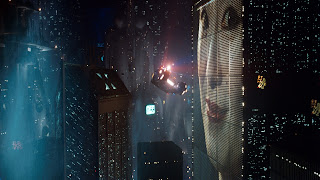
From Roberto Rossellini's pioneering study of post-war Europe, Germany Year Zero (1947).

Our future? From Ridley Scott's Blade Runner (1982).
Several years ago, I was poking around one of the antique stores on King Street when I discovered two reels of 16mm film for sale, cheap. I bought the reels, took them home, and after doing some repair--the splices were a mess--I ran the film through a projector. The reels were home movies of someone's European vacation, shot in the late-1940s. The central "character" in the footage was a middle-aged woman, and my guess is that her husband was behind the lens. It was fun to watch the woman strike poses in Paris and Venice, but my attention kept wandering to the mise-en-scene behind her; there were piles of rubble everywhere, evidence of Europe's slow recovery from the unimaginable devastation of World War II.
I went back to the antique store and asked the clerk if she remembered where she got the reels. She didn't, and to this day I feel guilty about owning another person's memories.
How do movies represent cities? How do they show urban blight or urban utopia? (Ironic fact: the word "utopia" literally means "noplace.") In class this week, we're going to discuss the city symphony, a genre of films that chart the social and psychological effects people experience when living in a giant urban environment like Manhattan (Manhatta) or Paris (Menilmontant).
To begin our exploration of the city symphony, I'd like you to answer a couple of questions in this week's blog response. First: out of the films we watched this week in class, which ,in your opinion, most accurately captures what it's like to live in a city? (Be sure to explain your choice.) Second: name one non-class film that is noteworthy in its presentation of urban space. I'd pick Blade Runner (Ridley Scott, 1981), which creates a techno-noir future Los Angeles of exponential overpopulation and seismic cultural shifts. (Next time you see the movie, notice how many street signs are in Japanese: this is an America that no longer belongs to us.) Tell me about a movie city that you can't forget...
Incidentally, the city symphony is alive and well on Youtube. Here's one contemporary example, about my favorite North American city. Chicago.

